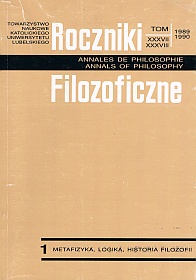A Philosophical Approach to Death
Abstract
In the problems concerning death there dominate today the Heideggerian and Thomistic approaches.
According to the Heideggerian approach, death is a way to free man from limitations and to achieve ontic maturity. This is different to what L. Boros and K. Rahner say on that subject-matter.
- Boros thinks that death is a characteristic of man's and that it is still going on in man as privation. We lack in achieving the purpose, full cognition and complete love.
- Rahner thinks death to be a total fulfillment of man. At the moment of death man becomes an integrated combination of his own intellectual and volitional actions. Man's body dissipates in the material cosmos, and his soul becomes a form of the whole matter of cosmos.
According to St Thomas, death consists in the destruction of man by way of separating soul from body. Soul and body are two principia of one essence of man. Soul is the form of body. Body is a principle of soul's individuality. Death consists in tearing one being apart. As a result of this the body dies. The soul, however, goes on living thanks to the fact that it is embraced and made real by existence in which the soul is a potentiality.
The differences between the Heideggerian and Thomistic approaches have their source in two different theories of man.
According to the Heideggerian approaches, man is only a personality which is being constituted at the moment of death from the acts of intellect and will. Soul and body do not make man. They are only a site of intellectual and volitional acts. Soul and body remain in the cosmos as his parts. Only our personality is bound to be redeemed.
According to St Thomas, death is not a property of man's life and is not the reason why man is being constituted. It does not decide about man's destiny. The reason why man is being constituted is his existence and essence which is filled by soul and body. It is man's love that decides about his destiny. And it is not death that makes possible for us to turn to God and be redeemed but love at the moment of death.
Copyright (c) 1990 Roczniki Filozoficzne

This work is licensed under a Creative Commons Attribution-NonCommercial-NoDerivatives 4.0 International License.





